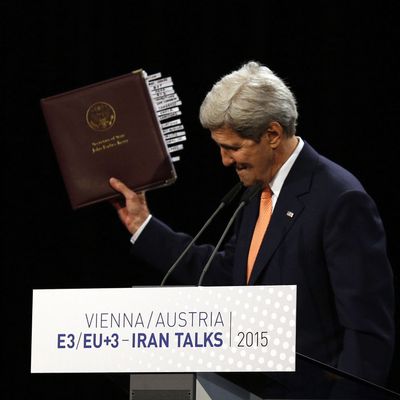
The best argument for the agreement with Iran is that there is no realistically better alternative. The United States has only managed to hold together international support for sanctions based on the promise that they’d be used to leverage a deal with Iran. Without a deal, the sanctions would disintegrate, leaving war as the only option.
Right-wing critics deny this. In his speech to Congress, Benjamin Netanyahu insisted the alternative to the deal was not war but “a better deal.” Today’s Wall Street Journal editorial calls Obama’s argument a “false political choice”:
“There really are only two alternatives here. Either the issue of Iran obtaining a nuclear weapon is resolved diplomatically through a negotiation or it’s resolved through force, through war. Those are—those are the options,” Mr. Obama said. He added that no better deal was or is possible than the one he has negotiated.
Mr. Obama knows there has always been an alternative to his diplomacy of concessions because many critics have suggested it. It’s called coercive diplomacy, and it might have worked to get a better deal if Mr. Obama had tried it.
But if you go back a few years to the start of the administration’s efforts to organize sanctions against Iran, the Journal was advocating war and denying there was any alternative. A 2011 Journal editorial argued, “The serious choice now before the Administration is between military strikes and more of the same. As the IAEA report makes painfully clear, more of the same means a nuclear Iran, possibly within a year.” Now the exact trade-off the Journal insisted was the “serious choice” — in an editorial that never even considered the possibility of sanctions at all — it now insists is a “false political choice.”
The right’s current belief that the international sanctions regime can be maintained more or less indefinitely is puzzling. After all, it’s usually liberals who are most optimistic about the prospects for international cooperation, and conservatives who are most pessimistic. When the issue is climate change, the conservative line is completely fatalistic — there’s no point in even trying to herd the world’s cats into a unified plan of action. The benefits of free-riding are too great. Indeed, not long ago conservatives did argue this. In 2011, the Journal dourly predicted, “We doubt that sanctions will stop Iran’s nuclear program, but without enforcement the effort is hopeless.” In 2010, it dismissed “inevitably useless negotiations with Tehran.” Now conservatives seem to have convinced themselves that not only the cheese-eating surrender-monkeys of Western Europe, but even such noxious regimes as Russia and China, will support sanctions against Iran enthusiastically, and that negotiations can yield even stronger concessions than the ones Iran gave up.
The Journal editorial page has no real theory as to why the rest of the world is so eager and willing to maintain sanctions against Iran. However, it’s extremely confident that, once lifted, those countries will fight tooth and nail to prevent the sanctions from ever returning. Yesterday’s Journal editorial scoffs at the notion that Iran could face any consequences for cheating on the deal:
Mr. Obama’s answer here is that he or his successor can reimpose sanctions, but that will be a tough sell once sanctions relief kicks in over 12 to 16 months and a pro-Iran commercial lobby resurfaces in Europe, China and Russia. A committee of the eight signatories would have to vote to restore sanctions. “Snap-back” is a mirage.
So the Journal’s fear is that Iran can cheat, and Europe, Russia, or China would block a vote to reimpose sanctions. Except the agreement is specifically designed to deny them the ability to block the reimposition of sanctions. If the United States (or any country on the eight-member panel) charges Iran with noncompliance, sanctions will automatically go into effect unless the Security Council votes to delay them. The Council on Foreign Relations explains:
Negotiators devised a unique mechanism to guard against the possibility that Russia or China, who have shielded Iran from punitive Security Council actions in the past, might block the restoration of sanctions in the event of Iranian noncompliance with a Council veto. The agreement calls for an eight-member panel made up of the five permanent members of the Security Council, Germany, the European Union, and Iran that is empowered to investigate Iranian noncompliance. The committee could restore U.N. sanctions within 65 days by a majority vote. In such instances, even if China and Russia objected, they could not block the restoration of sanctions.
The Journal’s insistence that “snap-back is a mirage” seems to be based on its incorrect belief that “a committee of the eight signatories would have to vote to restore sanctions.” This is probably the single most important feature of the agreement, and the Journal editorial page is unaware of its existence. The Journal, a prestigious voice of the conservative intelligentsia, in this sense perfectly represents conservative thought on the Iran issue. It is driven by reflexive belligerence and partisanship, unburdened by logical consistency or any grounding in relevant fact.






























